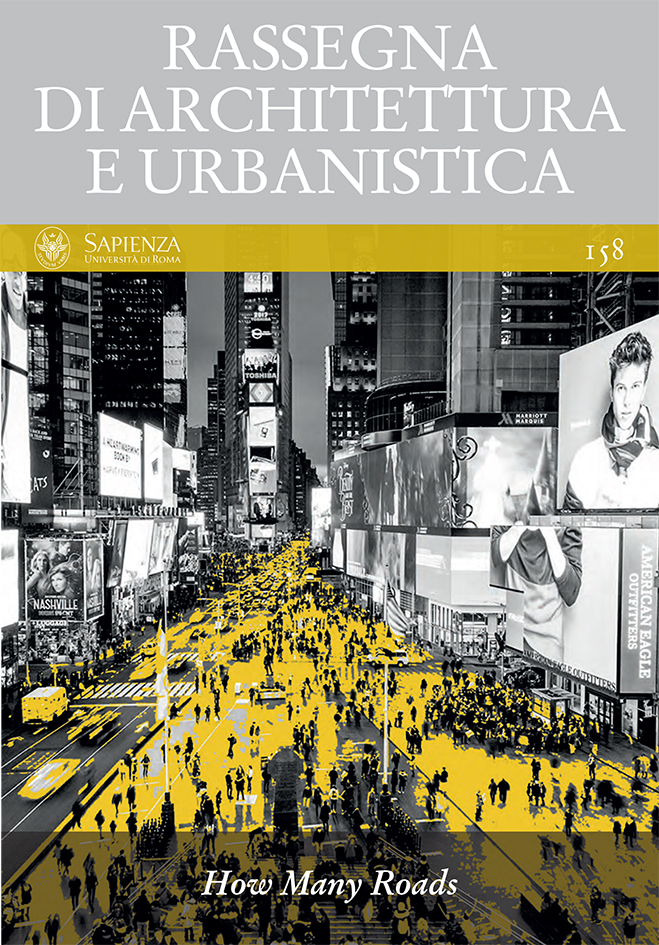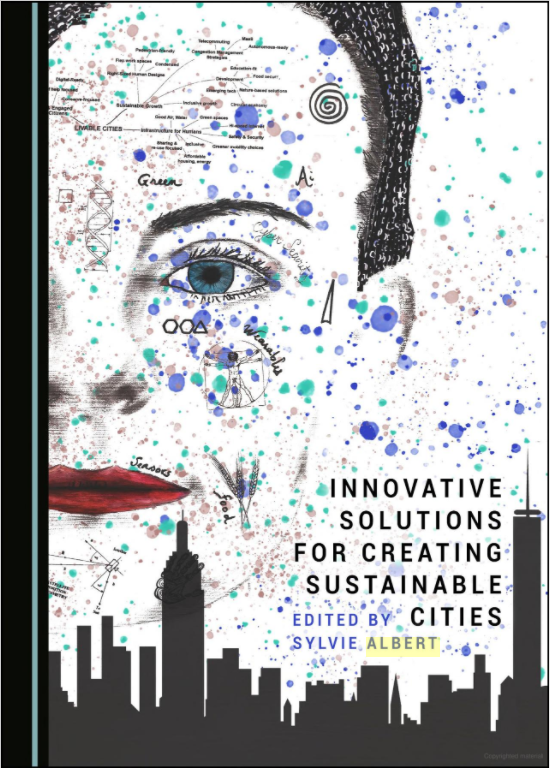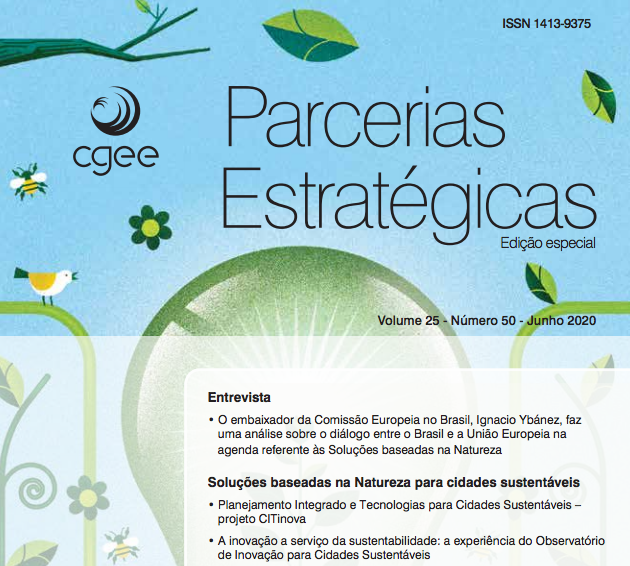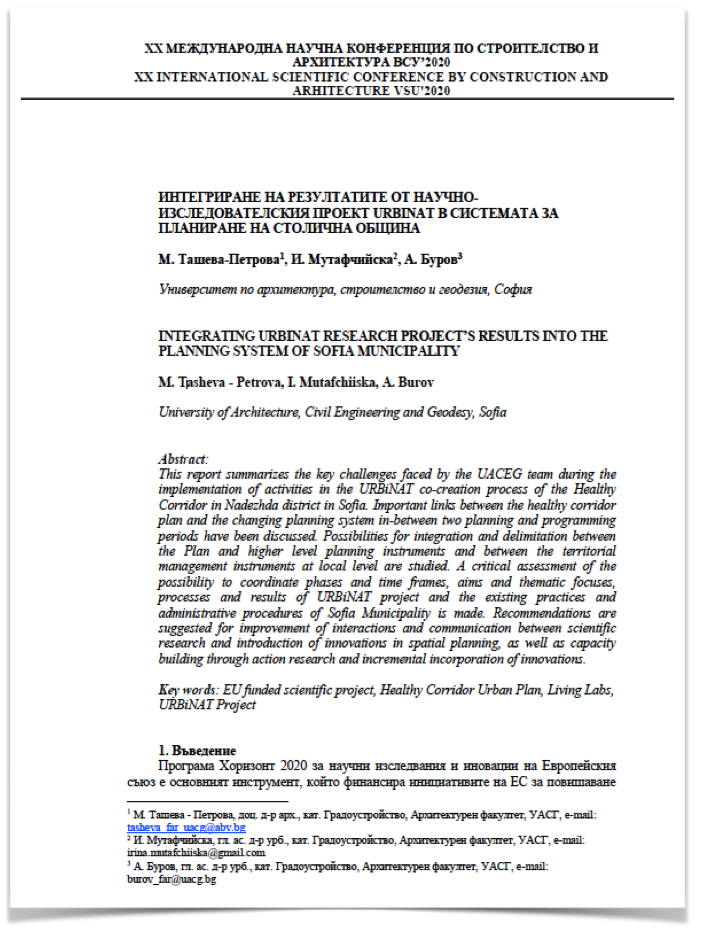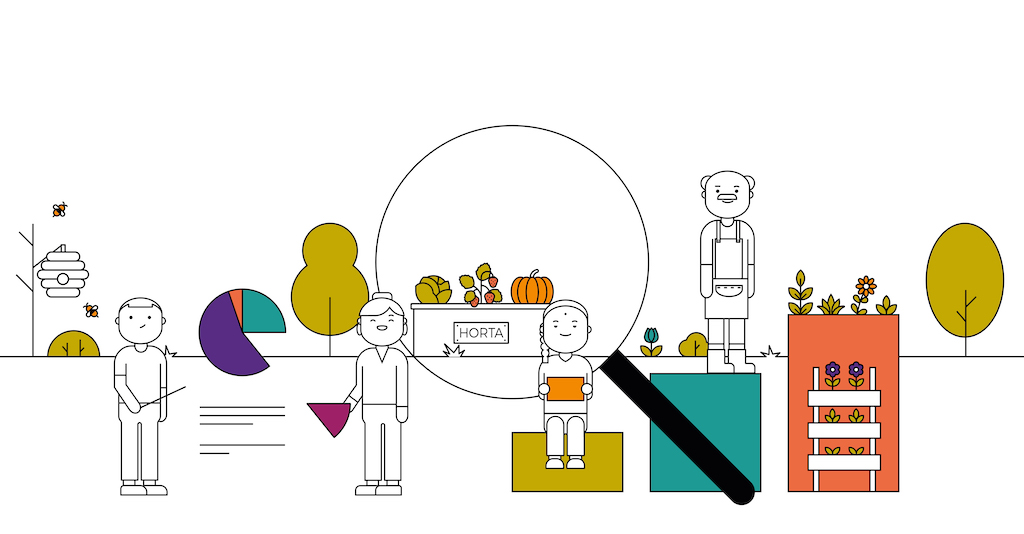
Resources
Resources and Project Milestones
This page contains links to the different types of outputs of the URBiNAT project. These include formal project outputs (deliverables), related outputs (articles, manuals, posters), academic papers, book chapters and other materials that have been produced as part of the project. Each section of the page corresponds to different areas of activity.
Our aim is to publish as many resources as possible in an Open Access format. Nonetheless, some resources are “restricted” meaning that they are limited to certain audiences. Permission to access these documents can be obtained on request. URBiNAT project resources are also available on other pages of the site.
M1: Theoretical & Methodological Foundations
D3.1: Strategic design and usage of participatory solutions and relevant digital tools in support of NBS uptake
This deliverable identifies the actors involved in participation and the conditions needed for active, positive and ethically sound participation. In doing so, the deliverable takes stock of the existing methods and tools for participation being used and likely to be used in the future. Furthermore, it gathers insights for strategic design and usage of participatory solutions and relevant digital tools in support of NBS uptake. This stocktaking activity provides URBiNAT with insight as to the state-of-art regarding the use of relevant participatory solutions, including digital technologies and tools, applied by stakeholders in the frontrunner and follower cities; their ease of use; services provided; usage levels and drawbacks associated with them. The objective is to have a picture of the existing participatory culture in the frontrunner and follower cities. In addition, the deliverable will begin to shed some light on actual and potential collaboration among stakeholders to enhance citizen participation in local communities in frontrunner and follower cities. This will be based on a generic model for the assessment of existing participatory culture, as well as engaging part of URBiNAT's portfolio of participatory solutions for application in the cities.
D3.2: Community Driven Processes to Co-Design and Co-Implement NBS
Deliverable 3.2 (D3.2) is the second deliverable of work package 3 (WP3) on citizens’ engagement. D3.1, submitted in month 12 of the project, reported on the strategic design, use of participatory solutions and relevant digital tools in support of the uptake of n ature-based solutions ( NBS). D3.2 reports on the advancements of the URBiNAT project in tailoring participatory methods and tools to city cultures for the co-design and co-implementation of NBS processes.
M2: Living Labs & Community of Practice
As part of the URBiNAT project collaborative laboratories (Living Labs) are being established within Frontrunner and Follower cities for the implementation of pilot NBS solutions in urban regeneration strategies. LABS serve to upgrade critical urban areas and
to enhance collective cooperative attitudes towards sustainability and the adoption of sustainable solutions. These operative structures will include representatives from municipalities, local communities, universities, research centers, industries and citizens.
D2.3: On the establishment of URBiNAT's Community of Practice (CoP)
This document presents the context for URBiNAT’s Community of Practice (CoP), its objectives, how it is framed also outlines its further development and potential outcome and benefits for various actors. The report is directed to the widest defined circle audiences that are interested in the URBINAT project and its contribution. It builds on and gives extensive reference to URBiNAT’s concept and its working methods, however, and thus refrains from attempting to achieve easy readability for the general public. This is a working document with restricted access only for the time being. The final version of the document will be made accessible for public access in due course.
Milestone 2: URBiNAT Living Labs & Community of Practice RESTRICTED
Milestone 2 consists on the establishment of “Living labs with its CoP (Community of Practice) in 7 cities (frontrunners and followers cities) and in the non-European cities to start coaching and sharing, in order to develop the participatory process and the urban planning" (Grant Agreement). With this document it is possible to state that all URBiNAT cities have successfully established their Living Labs, even though in different stages of development (as expected). The document sets the key point of achievement of Milestone 2, by compiling and sharing the state of the art on the establishment of the Living Labs and CoP in Front-runner, Follower and Observer cities.
The access to this resource is restricted. If you don't have the Basecamp credentials click "Request access" button below to fill the form.
M3: Digital Platforms and Participatory Handbook
D3.3: Portfolio of Methods, Tools and Content - Forming Digital Enablers of NBS
This deliverable has been framed for the objective of collecting and structuring information as a basis for enhanced understanding of how to apply so-called “digital enablers” to support the co-creation process around NBS and healthy corridors in URBiNAT cities, and to draw wider lessons thereof. Despite the opportunities offered by digitalisation, as observed in ambitious plans for the development of smart cities, urban planners continue to struggle in addressing serious outstanding issues, including fragmentation and lack of engagement by disadvantaged groups. Although the application of Information and Communication Technologies (ICT) will not by itself resolve these issues, the constructive application of digital enablers can be greatly helpful. Building on the experience at hand and linking to the evolving experience of URBiNAT cities, this report sets out to cast new light on ways forward in this respect. The audience includes members of the URBiNAT project along with others interested in the project and lessons on how to address the issues at hand.
D3.4: Toward Implementing Digital Enablers in URBiNAT Cities
The objective of the present deliverable is to examine conditions for Digital Enablers in URBiNAT cities, prepare and initiate new use and draw lessons for their continued advancement on terms relevant for the co-creation of Nature-Based Solutions (NBS) and Healthy Corridors. The title has been slightly adjusted from the Grant Agreement, to appropriately reflect that the advance of these programmes has been subjected to some delay due to the COVID-19 pandemic.
D3.5: Healthy Corridor Participatory Process Report / Toolkit
The approach we took in preparing this deliverable was based on the understanding, that the responsible team preparing and organising the participatory design process of the URBINAT project, needed a manual in toolkit format so that the internal dissemination of good practices and agreed tool descriptions could be as effective as possible. Furthermore, it would be the guiding principles and practices of each of the cities in URBiNAT in their participatory design processes. From the beginning, we want to signal that the process will be open to customization, adaptation and parameterization by the local city teams according to their contexts, experiences, knowledge and willingness to experiment / innovate in the way they involve and create commitments with their stakeholders, citizens and other resources engaged in the territory. Prior to gathering an information report, incl. an evaluation of how the participatory design processes are conducted in cities, we understand that it is necessary to present a guide / toolkit describing the general process itself.
For more blog posts on the co-selection and use of Digital Enablers as part of the URBiNAT project click HERE
M4: Healthy Corridor Urban Plans
D4.2: URBiNAT Healthy Corridor Concept
The “Healthy corridor Concept” aims to establish the general framework of the healthy corridor urban plan (part 1) and present its application in the three front runners by the local task force: Porto (part 2), Sofia (part 3), Nantes (part 4). The general framework redefines the concepts, principles and the methodologies related with the healthy corridor urban plan, taking in consideration previous deliverables and integrating the experience acquired in the cities during the co-creation process
4.2: Healthy Corridor Concept - PORTO
In Porto city, Campanhã parish was identified as one of the priority areas for urban regeneration aiming at a more sustainable improvement of local living conditions. This area faces severe socio-economic challenges territorial aggravated by isolation, due to lack of accessibility, safety, feeling of security and poor overall conditions of the urban space. Despite these challenges, this area is especially rich in green areas and vacant lots that represent unique opportunities for urban regeneration to tackle the identified issues, especially through the use of multifunctional nature-based solutions (NBS). The potential for improvement in this area is fairly recognized by the number of strategic investments that the Municipality of Porto is planning for the area.
4.2: Healthy Corridor Concept - SOFIA
The core of the intervention area is under final estimations and will be precisely defined after the co-design of the NBSs and the zones of intervention. The location of the specific interventions related to the co-implementation of the NBSs is in about 20 vacant lots provisioned by the plans as part of the green infrastructure and public spaces in the four residential estates, namely Lev Tolstoy, Nadezhda 2 and 4 and Svoboda. The 2,5 km long axis of the Healthy corridor provides connection between Severen park and park Nadezhda and integrates important available territorial resources related to the major themes of the URBiNAT project – mobility, energy, water and nature.
4.2: Healthy Corridor Concept - NANTES
Nantes Nord perimeter is the study area. This corresponds both to the diagnostic and evaluation scale. The intervention area focuses on a reduced area in the North of Nantes Nord, where are the priority districts (QPV), the social housing districts with concentration of difficulties. Located in the north-western part of the city, the “Nantes Nord” district is one of the 11 districts of Nantes municipality. It is itself subdivided in 9 micro-districts.
D2.4: Urban plan for Porto, Nantes, Sofia (Demonstrator)
Deliverable 2.4 is a demonstrator of the proposal for urban plans of the Healthy Corridor in the URBiNAT frontrunner cities - Porto, Nantes, Sofia. The proposals were co-designed by the local taskforce with citizens and stakeholders according to the co-creation methodology. In this sense, the urban plan of the healthy corridor of each city integrates three main achievements: firstly, the local diagnostic, where the needs and expectations for the territory and for the community were identified; secondly the healthy corridor concept where the NBS proposed by the citizens were integrated in the global strategy for the local living lab and thirdly the co-implementation of NBS based on the stakeholders advisory board, where citizens follow the planning and construction procedures.
D2.7 Healthy Corridor Urban Plans For Follower Cities
Deliverable 2.7 aims to establish the general framework of the healthy corridor urban plan and present its application by the local task forces in the four follower cities – Høje-Taastrup, Brussels, Siena, Nova Gorica – and in the observer city of Khorramabad.
NBS Implementation Strategy
D4.1: New NBS - Co-Creation of URBiNAT NBS (live) Catalogue and Toolkit for Healthy Corridor
The aim of this deliverable is to define and explain the URBiNAT NBS “living” Catalogue and to introduce the New NBS that have been co-created in frontrunner cities. The document describes the rationale behind the development of the URBiNAT NBS “living” Catalogue and the connection between the latter and the process for the co-creation of a Healthy Corridor. It also describes each NBS of the catalogue according to the research carried out so far, as part of the project. This information aims to generate a reference document that can be used as a tool by municipalities (e.g. follower and observer cities) that plan to regenerate urban areas using a catalogue of NBS.
D4.3: NBS Implementation Strategy, Pt 1
This deliverable is dedicated to the coimplementation strategy of the healthy corridors in the three frontrunner cities in the frame of task 46 Firstly the Healthy Corridor HC concept D42 will be developed as an urban project by the city urban planning office Porto Nantes and Sofia and by the local partner ICETACIBIO CNRSIRSTV UASG with the participation of the citizens The cities will contract consultants to support the project if needed and will contract facilitators to develop the codesign process The horizontal partners that developed the HC Concept task 44 and its NBS task 42 will coordinate the urban project Secondly the urban project task 24 and 45 will be built by the municipality of Porto Nantes and Sofia that will promote the public tenders to select private construction companies The municipality will supervise the HC construction with the support of the local partner The local partner will support the costs related to the development and supervision of the HC urban project The technological NBS will be built by IAAC Cities will provide the infrastructures necessary to its implementation The deliverable will be an urban project and the construction of the HC
M5: URBiNAT Observatory - Monitoring of NBS and Healthy Corridor
The Observatory for Urban inclusive and innovative Nature serves to promote international cooperation for the replication of NBS among EU and non-EU countries. The Observatory combines the observation, monitoring, and reporting of NBS for inclusive urban regeneration, with high-level research activities.
Data Management
D1.3: Data Management Plan
The purpose of this document is to provide an initial version of URBiNAT’s Data Management Plan (DMP). This is a living document which will be updated during project development when the need arises in order to improve the internal processes. The DMP derives from Task 1.3 “Innovation, IPR and data management” of Work Package 1 “Management of consortium and project’s general implementation”. It constitutes the Deliverable D1.3.
The Observatory of the URBiNAT partners supports the analysis and monitors the development, implementation, and impacts of the Healthy Corridors and NBS. City administrations, the citizens of the Living Labs, and other stakeholders and experts, can access the tools that are developed as part of the Observatory.
Local Diagnostic Reports
D2.1: Local Diagnostic Report for each Frontrunner City
This report describes the variables explored in the first and second stage of the Local Diagnostic. In the first stage, it is requested that the cities provide secondary information of use to framing their specific relevant conditions. Such information will be helpful for further identifying the location and wider context for the implementation of healthy corridors, with the prospect of enabling real improvement of the quality of life for citizens.
D2.6: Local Diagnostic Report for each Follower City
The Local Diagnostic (LD) Stage 1&2 reports for the follower cities of the URBiNAT project follow the example of the LD reports from the frontrunner cities, submitted in December of 2019 under Deliverable 2.1. The purpose of the follower city diagnostics is to conduct an in-depth analysis of current urban conditions in all four intervention areas, plus the study site of Khorramabad. The observer city Khorramabad has been actively involved in all URBiNAT activities, implemented URBiNAT citizen engagement and participation methodologies and facilitated a project visit for all URBiNAT partners to learn and apply co-creation and co-participation models for successful urban regeneration initiatives in the study area.
M6: Communication & Dissemination
Project Deliverables
D1.7: Dissemination package: basic set of dissemination material for the project
The URBiNAT Project was conceived from the outset as a consortium of partners where the institutions (academic, municipal and business partners) will work at different moments in conjunction with the inhabitants of the cities and neighbourhoods where the actions of regeneration and integration will be thought through an innovative and inclusive catalogue of Nature-Based Solutions (NBS). This document contains information relating to the visual identity of the URBiNAT project (fonts, logos, presentation templates, business cards etc.).
D6.2: URBiNAT Website and Newsletter
This document includes the technical and design specifications for the URBiNAT website.
It is an internal document for use by URBiNAT Consortium Members only.
URBiNAT Newsletter
Sign up to our quarterly newsletter for news and updates about the project.
M7: Market Potential of NBS
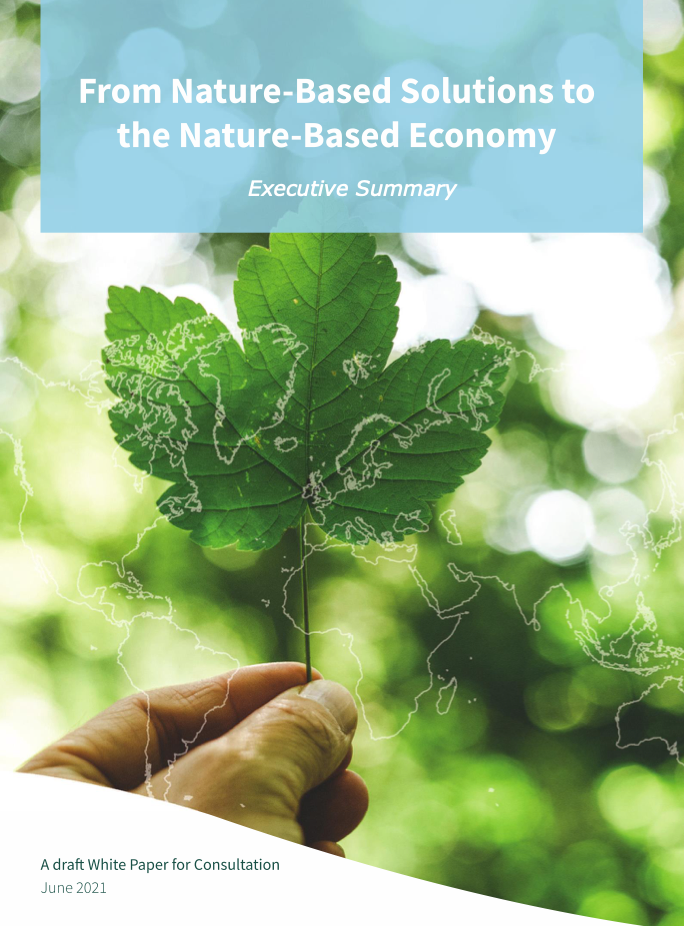
Project Deliverable
7.1: Market potential of Nature-Based Solutions
The purpose of this task is to identify and validate costs, benefits and key enabling features of best practice NBS by conducting a web-based survey and more in-depth interviews with the stakeholders involved in the implementation of NBS and articulated in WP2. These key stakeholders include, but are not limited to, start-ups, citizens, city administration, corporate clients, URBiNAT experts, researchers, and technical experts.
The compilation of a multi-stakeholder analysis enables us to identify key community stakeholders and determine who are the key stakeholders (public, private and civic) engaging and collaborating on NBS project delivery in each front-runner city. With the assessment of local public, private and civic stakeholders’ ability to collaborate on implementation of best practice NBS, we can estimate the intangible costs and benefits of implementation, whilst the tangible costs and benefits are revealed in task 7.3 that focuses on writing up business cases for the most marketable and bankable NBS solutions.
White Paper
[White Paper] From Nature-Based Solutions to the Nature-Based Economy
Author(s): McQuaid, Siobhán; Rhodes, Mary-Lee; Andersson, Thomas; Croci, Edoardo; Feichtinger-Hofer, Marianne; Grosjean, Matthieu; Lueck, Alina; Kooijman, Esmee; Lucchitta, Benedetta; Rizzi, Daniela; Reil, Alice; Schante, Joanne
Published in: From Nature-based Solutions to the Nature-based Economy - Delivering the Green Deal for Europe. Draft White Paper for consultation. Nature-based Economy Working Group of EC Task Force III on Nature-based Solutions, 2021
Publisher: NA
DOI: 10.5281/zenodo.5055605
----------------
Decades of research and more recently public policy recognise that current economic practices are not compatible with a healthy planet. The European Green Deal aims to decouple economic growth from resource usage, decarbonise industry and do this in a fair and just way for society. Nature-based solutions (NBS) to address societal challenges have been identified as an important policy instrument to achieve the aspirations of the European Green Deal and other key policy objectives such as those set out in the EU Biodiversity for 2030 Strategy and the ambitions of “building back better” from the impact of COVID-19 in the EU Recovery plan. The European Commission identifies nature-based solutions (NBS) as those solutions to societal challenges that are “inspired and supported by nature, which are cost-effective, simultaneously provide environmental, social and economic benefits and help build resilience. Such solutions bring more, and more diverse, nature and natural features and processes into cities, landscapes and seascapes, through locally adapted, resource-efficient and systemic interventions” (Faivre et al., 2017). Nature-based solutions provide multiple benefits for biodiversity. While much focus to date has been on the environmental or social benefits of NBS, less attention has been paid to their economic potential and their role in a just transition to the type of sustainable economy envisaged in the European Green Deal.
M8: Publications & Policy Briefs
M8: Policy Brief “Towards a Policy Framework for Promoting Nature-based Organisations (NBOs)”
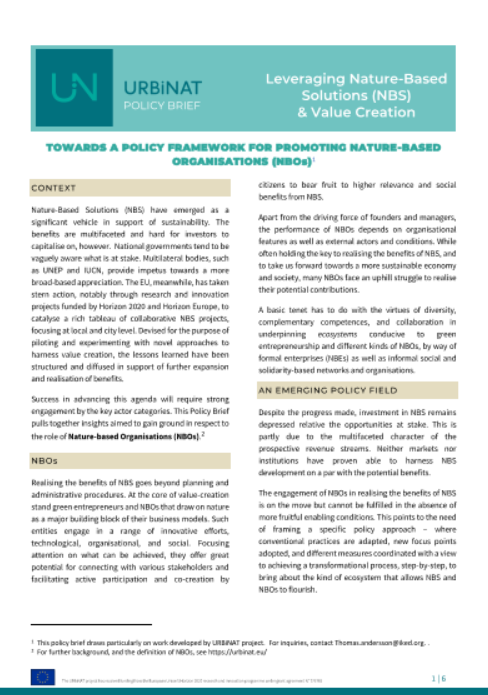
[Policy Brief] Innovating with urban governance: municipal committees for inclusive, nature-based solutions
This policy brief explores the challenges and innovative opportunities for institutionalising participatory processes within municipal contexts. Specifically, we report on the creation of municipal committees, a proposal framed within the EU-funded project URBiNAT aimed at co-creating healthy corridors made up of a combination of nature-based solutions (NBS). The proposed committees aim to consolidate citizens’ engagement in the process of co-creating NBS, by offering opportunities for: cooperation and co-production between citizens, public authorities
and stakeholders; building consensus through possibilities to influence, negotiate and deliberate on decisions; handling emerging conflicts, dissensus and disagreement.
Evaluating the impact of Nature-Based Solutions: A handbook for practitioners
Author(s): Adina Dumitru and Laura Wendling, Eds.
Published in: 2021, ISBN 978-92-76-22821-9
Publisher: European Commission
DOI: 10.2777/244577
--------------------
ABSTRACT: The Handbook aims to provide decision-makers with a comprehensive NBS impact assessment framework, and a robust set of indicators and methodologies to assess impacts of nature-based solutions across 12 societal challenge areas: Climate Resilience; Water Management; Natural and Climate Hazards; Green Space Management; Biodiversity; Air Quality; Place Regeneration; Knowledge and Social Capacity Building for Sustainable Urban Transformation; Participatory Planning and Governance; Social Justice and Social Cohesion; Health and Well-being; New Economic Opportunities and Green Jobs. Indicators have been developed collaboratively by representatives of 17 individual EU-funded NBS projects and collaborating institutions such as the EEA and JRC, as part of the European Taskforce for NBS Impact Assessment, with the four-fold objective of: serving as a reference for relevant EU policies and activities; orient urban practitioners in developing robust impact evaluation frameworks for nature-based solutions at different scales; expand upon the pioneering work of the EKLIPSE framework by providing a comprehensive set of indicators and methodologies; and build the European evidence base regarding NBS impacts. They reflect the state of the art in current scientific research on impacts of nature-based solutions and valid and standardized methods of assessment, as well as the state of play in urban implementation of evaluation frameworks.
Evaluating the impact of Nature-Based Solutions: A summary for policy makers
Author(s): Marcel Cardinali, Adina Dumitru, Sofie Vandewoestijne, Laura Wendling
Published in: 2021, ISBN 978-92-76-40745-4
Publisher: European Commission
DOI: 10.2777/521937
--------------------
ABSTRACT: This publication provides a high-level summary of the detailed information available in Evaluating the Impact of Nature-Based Solutions: A Handbook for Practitioners. The handbook aims to provide practitioners with a comprehensive impact assessment framework for nature-based solutions and a robust set of indi-cators to assess the impacts of nature-based solutions across 12 societal challenge areas: Climate Resilience; Water Management; Natural and Climate Hazards; Green Space Management; Biodiversity; Air Quality; Place Regeneration; Knowledge and Social Capacity Building for Sustainable Urban Transformation; Par-ticipatory Planning and Governance; Social Justice and Social Cohesion; Health and Well-being; and, New Economic Opportunities and Green Jobs. The accompanying volume, Evaluating the Impact of Nature-Based Solutions: Appendix of Methods, provides a brief description of each cited indicator of nature-based solution impact and recommends appropriate methods to measure specific impacts, along with guidance for end-users about the appropriateness, advantages and drawbacks of each method in different local contexts.
Evaluating the impact of Nature-Based Solutions: Appendix of Methods
Author(s): Adina Dumitru and Laura Wendling, Eds.
Published in: 2021, ISBN 978-92-76-22960-5
Publisher: European Commission
DOI: 10.2777/11361
----------------------
ABSTRACT: The Handbook aims to provide decision-makers with a comprehensive NBS impact assessment framework, and a robust set of indicators and methodologies to assess impacts of nature-based solutions across 12 societal challenge areas: Climate Resilience; Water Management; Natural and Climate Hazards; Green Space Management; Biodiversity; Air Quality; Place Regeneration; Knowledge and Social Capacity Building for Sustainable Urban Transformation; Participatory Planning and Governance; Social Justice and Social Cohesion; Health and Well-being; New Economic Opportunities and Green Jobs. Indicators have been developed collaboratively by representatives of 17 individual EU-funded NBS projects and collaborating institutions such as the EEA and JRC, as part of the European Taskforce for NBS Impact Assessment, with the four-fold objective of: serving as a reference for relevant EU policies and activities; orient urban practitioners in developing robust impact evaluation frameworks for nature-based solutions at different scales; expand upon the pioneering work of the EKLIPSE framework by providing a comprehensive set of indicators and methodologies; and build the European evidence base regarding NBS impacts. They reflect the state of the art in current scientific research on impacts of nature-based solutions and valid and standardized methods of assessment, as well as the state of play in urban implementation of evaluation frameworks.
Academic Papers & Articles
[SOFIA] Sustainable management of open public space in a large housing estate in Sofia- Integrating physical characteristics and social dimensions
ABSTRACT: Designed as social space according to CIAM principles in the second half of the 20th century, the open public space in the large housing estates in the periphery of Sofia was transformed for the recent 30 years due to the changing socio-economic, political, and cultural conditions. The broad open spaces have been adapting to the arising societal demands, changing lifestyles and mixed uses by accommodating competing or complementary uses, generating new activities or “waiting” update or re-design. The paper discusses the potential of integrating social dimensions and physical characteristics for sustainable management of open public space in large housing estates. Based on a case study approach developed within on-going research project, the paper summarizes the results from the set of conducted qualitative and quantitative methods, spatial analyses, and participatory activities in the URBiNAT Living Lab in Nadezhda district, Sofia. Urban open space is analysed as territorial asset and through the social practices thus revealing the complexity of overlapping roles, users, and audiences. The perceptions, attitudes, dreams, and aspirations towards public space as well as the motivations and liability to participate are studied from the perspective of pupils, citizens and district administration staff. The research findings outline the need for reinventing urban policy by integrating the right-based approach into all phases of public space lifecycle management, (re)considering traditional property and ownership paradigms, building new frameworks for participation and meeting local institutional efforts and bottom-up movements, establishing dialogue with diversity of actors, and providing flexible design that enables multiple interpretations and uses.
[Conference Proceeding] HURBE2021 – Making Healthy Cities for People
4 – 5 October 2021: URBiNAT researchers from Frontrunner City Sofia (Bulgaria) and Follower City Nova Gorica (Slovenia) introduced URBiNAT themes during the HURBE2021 Conference.
[Academic Paper] Guidelines for Citizen Engagement and the Co-Creation of Nature-Based Solutions: Living Knowledge in the URBiNAT Project
Author(s): Nathalie Nunes, Emma Björner, Knud Erik Hilding-Hamann
Published in: Sustainability, Issue 13(23), 2021, ISSN 2071-1050
Publisher: MDPI Open Access Publishing
DOI: 10.3390/su132313378
-------------------
ABSTRACT: Participation and citizen engagement are fundamental elements in urban regeneration and in the deployment of nature-based solutions (NBS) to advance sustainable urban development. Various limitations inherent to participatory processes concerning NBS for inclusive urban regeneration have been addressed, and lessons have been learnt. This paper investigates participation and urban regeneration and focuses on the development of guidelines for citizen engagement and the co-creation of NBS in the H2020 URBiNAT project. The methodology first involves the collection of scientific and practical input on citizen engagement from a variety of stakeholders, such as researchers and practitioners, to constitute a corpus of qualitative data. This input is then systematized into guideline categories and serves as the basis for a deeper analysis with researchers, experts, and practitioners, both inside and outside URBiNAT, and in dialogue with other cases of participatory NBS implementation. The results highlight an ‘ecology of knowledges’ based on a ‘living’ framework, which aims to address the specific needs of various segments of citizens and to match citizen engagement to the participatory cultures of cities. Implications and further research are also discussed, with a special focus on the implementation of NBS. The conclusions broaden the research context to include the refinement of the NBS approach, with participation being seen as both a means and an end.
Selected Papers
[Book Chapter] Inclusive Urban Regeneration with Citizens and Stakeholders: From Living Labs to the URBiNAT CoP
Author(s): Gonçalo Canto Moniz, Ingrid Andersson, Knud Erik Hilding-Hamann, Américo Mateus, Nathalie Nunes
Published in: Nature-based Solutions for Sustainable Urban Planning. Contemporary Urban Design Thinking, 2022, Page(s) 105-146, ISBN 978-3-030-89524-2
Publisher: Springer
DOI: 10.1007/978-3-030-89525-9_5
--------------------
In recent decades, many city authorities have been implementing strategies for the development of urban regeneration in their central areas. Most of these processes aim to improve the use of public space, and are often to be found in historic areas and waterfronts. The aim of this text is to put forward an alternative urban regeneration plan which focuses on the peripheral areas of cities, areas which were often built as neighbourhoods of social housing, and which now face environmental challenges as well as social and economic ones. To this end, the URBiNAT H2020 project is promoting inclusive urban regeneration that engages citizens and stakeholders in all the stages of the co-creation process. The overall objective is to implement a cluster of human-centred, nature-based solutions (NBS) in order to create Healthy Corridors that bring together both material and immaterial solutions that will impact the environment and the wellbeing of the community. The activation of Living Labs in the seven URBiNAT cities is building a Community of Practice so that knowledge can be shared with project partners, within the cities themselves, and with the public in the wider world. The intermediate results achieved in the pilot case studies validate the overall methodology and are helping us to identify lessons to be learnt and recommendations for the future.
Moniz, G.C., Andersson, I., Hilding-Hamann, K.E., Mateus, A., Nunes, N. (2022). Inclusive Urban Regeneration with Citizens and Stakeholders: From Living Labs to the URBiNAT CoP. In: Mahmoud, I.H., Morello, E., Lemes de Oliveira, F., Geneletti, D. (eds) Nature-based Solutions for Sustainable Urban Planning. Contemporary Urban Design Thinking. Springer, Cham. https://doi.org/10.1007/978-3-030-89525-9_5
[Scientific Paper] Rassegna di Architettura e Urbanistica - ITALY - "Healthy Corridors for Inclusive Urban Regeneration"
Author(s): Moniz, Gonçalo Canto Ferreira, Isabel
Published in: Rassegna di Architettura e Urbanistica,, Issue 158, 2019, ISSN 0392-8608
Publisher: Sapienza, University of Rome
DOI: 10.1400/273027
----------------
The European Commission is promoting an inclusive urban regeneration, in the frame of the Smart and Sustainable cities, that should integrate the environmental approach, through the nature-based solutions (nbs), and the social approach, through the co-creation process. More than research projects, the financing programs, as H2020, are supporting innovation actions that move the research from the universities to the communities, creating living labs. These laboratories are holders, municipality technicians, companies and researchers in order to develop together solutions for new urban challenges.
[Scientific Paper] Co-criação de Soluções baseadas na Natureza envolvendo comunidades e oportunidades de diálogo Europa-Brasil
Journal Parcerias Estratégicas - v.25 - n.50 - junho de 2020 - Edição especial
Transformations around modes of production have changed the way citizens, users and consumers are considered and recognized in the processes of cocreation and co-production. However, at the same time that the spaces for networking and sharing are expanding, new challenges arise for co-production and co-government. In development since 2018, the URBiNAT project foresees the implementation of healthy corridors in 3 European cities. In these cities there are active living labs to promote processes of active involvement of citizens in the design and implementation of corridors through the catalogue of nature-based solutions (NBS). This paper aims to focus on the current understanding about participation and knowledge and how they operate at the level of URBiNAT strategies; and reflect on how a European project experience can dialogue with other experiences and contexts such as Brazil. It is an inclusive urban regeneration project centered on people, which tries out new approaches and new combinations of traditional approaches, and as inherent in its nature, prioritizes the specific aspects of its path.
[Book Chapter] An Example of a Sustainable Intelligent Community
Author(s): Toporkoff, Sylviane
Published in: Innovative Solutions for Creating Sustainable Cities, 2019, Page(s) 61 - 62, ISBN 1527-535932
Publisher: Cambridge Scholars Publishing
-----------------------
NBS for inclusive urban regeneration will be co-designed, co-developed and co-implemented in a trans-disciplinary, multi-stakeholder and participatory context. NBS consider the social sciences and humanities which play an essential role for social innovation, and thus addresses complex social and sociological challenges. The expected results of URBiNAT are multiple: it raises EU leadership and creates economic opportunities in global markets (supply and demand) with new products, services, protocols and standards. To ease the development of NBS appropriate measure favouring implementation include leveraging investments, reducing regulatory and administrative barriers, creating new local green jobs and, of course, increasing awareness of the benefits of renaturing cities. URBiNAT will demonstrate that the implementation of NBS is also a source of healthier, culturally diverse, and a greener, regenerated Europe, which may alter currently deprived districts as well as neglected or abandoned areas.
[Conference Paper] Les Solutions Basées sur la Nature: Une Stratégie d'Adaptation aux Changements Globaux
ABSTRACT: Les effets du changement climatique en Afrique subsaharienne commencent à être bien connus, en lien avec la hausse des températures et la modification des précipitations. Ils touchent de nombreux secteurs vitaux tels que l’alimentation, l’eau, la santé. En parallèle, l’urbanisation croissante passée et future, à l’échelle mondiale et africaine, peut accentuer certains de ces effets en milieu urbain, en lien avec la gestion de l’eau et le confort thermique, entre autres. A l’échelle européenne, les solutions fondées sur la nature sont proposées comme stratégie d’adaptation, dans les villes. Elles permettent en effet d’améliorer la gestion des eaux pluviales urbaines et le confort thermique. Elles ont d’autres bénéfices comme la santé, la cohésion sociale, la sécurité, etc. Au travers de trois projets français (VegDUD) et européens (Nature4Cities, URBiNAT), les connaissances dernièrement acquises sur les performances de différentes solutions fondées sur la nature (toitures végétalisées, noues, arbres de rue, façades végétalisées, parcs) vis-à-vis des deux enjeux gestion de l’eau et confort thermique en ville sont présentées.
[RESEARCH PAPER] Integrating URBiNAT research project's results into the planning system of Sofia Municipality
This report summarizes the key challenges faced by the UACEG team during the implementation of activities in the URBiNAT co-creation process of the Healthy Corridor in Nadezhda district in Sofia. Important links between the healthy corridor plan and the changing planning system in-between two planning and programming periods have been discussed. Possibilities for integration and delimitation between the Plan and higher level planning instruments and between the territorial management instruments at local level are studied. A critical assessment of the possibility to coordinate phases and time frames, aims and thematic focuses, processes and results of URBiNAT project and the existing practices and administrative procedures of Sofia Municipality is made. Recommendations are suggested for improvement of interactions and communication between scientific research and introduction of innovations in spatial planning, as well as capacity building through action research and incremental incorporation of innovations.
[CONFERENCE PROCEEDINGS] SOFIA: Urban morphology and mobility partners: Myths and real-life transformations of a large housing estate in Sofia
The paper discusses the long-term urban planning impacts on the urban morphology and mobility patterns in the large housing estates designed and built at the periphery of Sofia in the period 1960-1990 and undergoing continuous transformations under the changing political, demographic, sociocultural and economic conditions in the country since 1990s. Based on a casestudy-based approach developed within ongoing URBiNAT research project (HORIZON 2020), and applying a set of qualitative as well as quantitative methods, spatial analyses (territorial mapping, behavioural mapping, quality of life survey), and participatory activities (cultural mapping, photovoice and walkthrough), the research undertaken in Nadezhda district, Sofia, outlines major urban challenges of the present day and claims needed changes in the planning approaches for building a healthy and socially inclusive urban environment.
[Research paper ??] Integrating biophotovoltaic and cyber-physical technologies into a 3D printed wall
ABSTRACT: The research presented in this paper investigates the development of ``3D printed ceramic green wall'', a technological Nature Based Solution (NBS) aimed at regenerating urban areas by improving spatial quality and sustainability through clean and autonomous energy production. Building upon previous research, the challenge of this system is to adapt additive manufacturing processes of ceramic 3D printing with biophotovoltaic systems while simultaneously developing digital and cyber-physical frameworks to generate site and user responsive design and autonomous solutions that optimize system performance and energy generation.
Ethics & Human Rights
D1.5: Compilation and Analysis of Human Rights and Gender Issues
The present deliverable D1.5 is the first report aimed at compiling and analysing human rights and gender issues in the scope of URBiNAT's planning, implementation and evalutation of activities, covering the first year of the project, from June 2018 to May 2019.
D1.8 / D1.9: Compilation and analysis of human rights and gender issues. Years 2 & 3
Second report aimed at compiling and analysing human rights and gender issues in the scope of URBINAT’s planning, implementation, and evaluation of activities, for the second and third years of the project, from June 2019 to May 2021. As cross-cutting dimensions, human rights and gender cover many aspects of the project and constitute lenses to be taken into consideration from the analysis applied in the research and innovation contents, to the completion of all stages of activities.
For more blog posts on human rights and gender issues and the URBiNAT project click HERE


